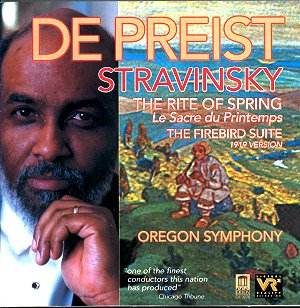 |
Igor STRAVINSKY (1882 - 1971) Crotchet
AmazonUK
AmazonUS |
The Oregon Symphony claims to be one of only six major orchestras established in the USA before 1900. Originally the Portland Symphony (the name was changed in 1967), it was founded in 1896. From the information on its excellent web site (www.orsymphony.org) it is apparent that it has had ups and downs during its history and, indeed the pressures of the Depression followed by those of wartime brought about an enforced suspension of its activities between 1938 and 1947. In fact, it was not until 1984 that the orchestra was put onto a full time basis.
It was in that year that they moved to a new, purpose-built concert hall in Portland. This was one of two turning points in the orchestra's history. The other had taken place in 1980 when the American conductor, James DePriest became Music Director. He is credited with the subsequent raising of both the standards and the profile of the orchestra to a significant degree.
On the evidence of this CD he has built a very fine orchestra and if I were a resident of Portland I think I would be pretty content. The Rite of Spring is a much-recorded work and has become an orchestral showpiece (very far from Stravinsky's original intention). This Oregon performance, if not perhaps a first choice, still shows up well in a very competitive field.
The performers are supported by a recording of amazing depth and detail. The quality of the sound which the Delos engineers have produced is simply fantastic. This is a score of infinite complexity but a copious number of individual details register. The recording also has a tremendous dynamic range with the loudest climaxes being captured faithfully.
Actually, before I listened to this disc it was some time since I had heard The Rite. One pronounced feature of DePriest's interpretation is that he brings out the sheer colour in the score. The listener is reminded of the extent to which Stravinsky's early music lay in the tradition of his teacher, Rimsky, and the Russian nationalist composers. Hear, for example the warm lyricism which DePriest and his players impart to 'The Mystic Circle of the Young Girls' (track10). Such passages, and there are more than one realizes, are undeniably impressive.
However, perhaps there is a price to pay for this lyrical approach. Much of the music of The Rite is visceral, pulsating and primal in nature. Here, I think DePriest's account lacks something. The performance did not have me on the edge of my seat in the way that, say, Rattle's CBSO account does. By just a hair's breadth the performance sounds careful, lacking that last degree of energy and abandon. This is a fine line to draw and is a very subjective judgement with which others may not agree.
The other piece on the CD, The Firebird, is given here in the suite extracted by Stravinsky in 1919. This receives a very fine performance. In particular the mysterious hush if the very opening is beautifully realized. The concluding apotheosis also comes off very well while the penultimate Berceuse is quite exquisite. If I have a reservation it is that the Infernal dance of King Katschei, which I regard as a touchstone for rhythmical drive and energy, is just a touch too well upholstered for my taste. It's exciting but, to my ears, it's not infernal.
In the final analysis I can't really recommend this as a first choice recording for either work. However, I hope I've made it clear there is much to commend the disc. The music has been thoroughly prepared, is very well played and is accorded sound of demonstration quality. It is a disc to which I shall want to return again as an alternative view of two of Stravinsky's most celebrated scores and one in which we can hear perhaps more of the inner detail than ever before.
John Quinn